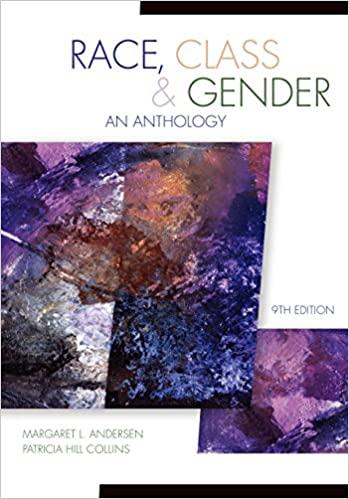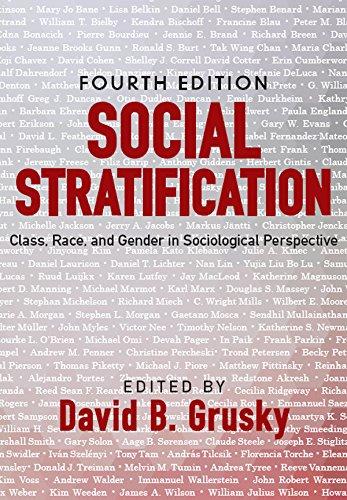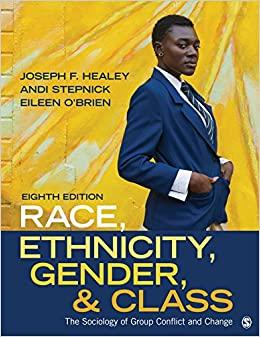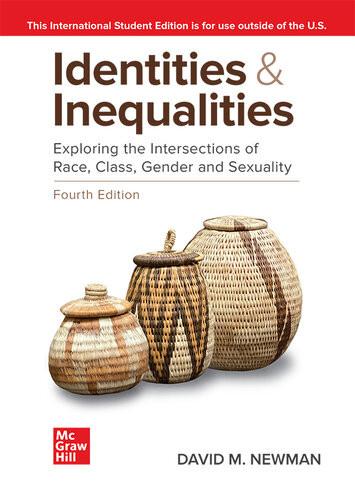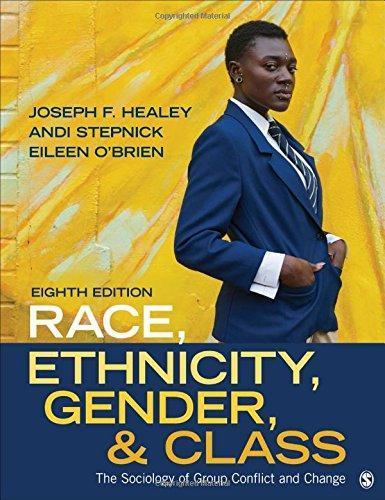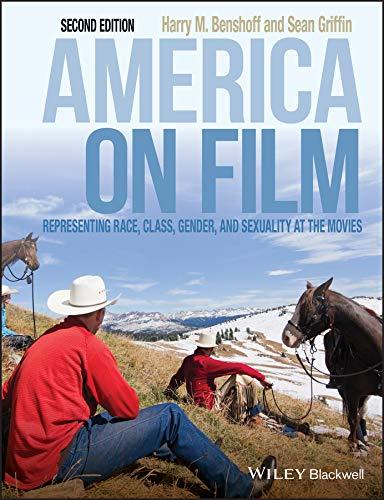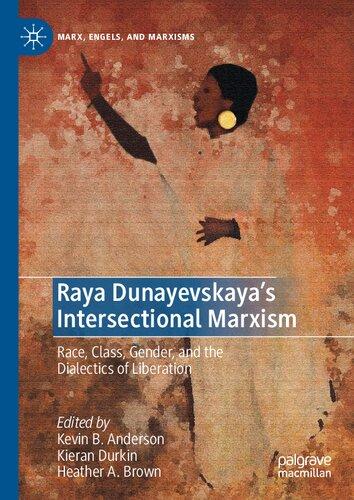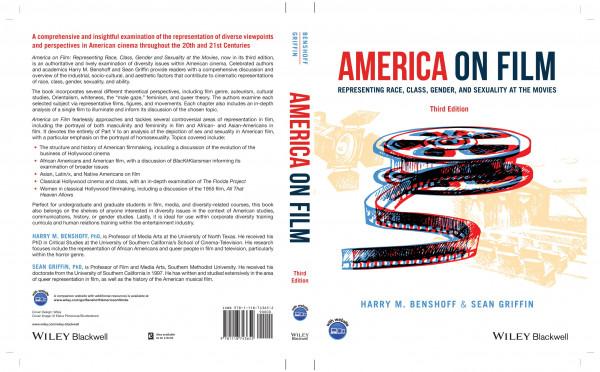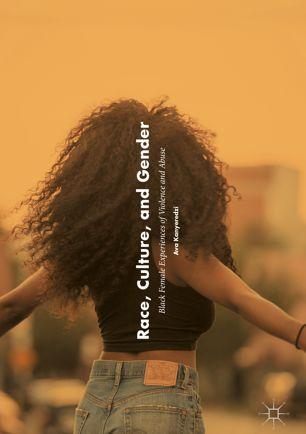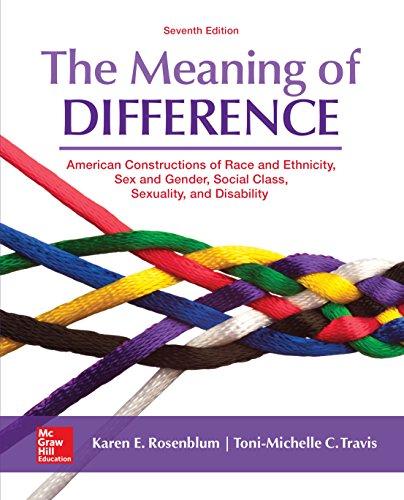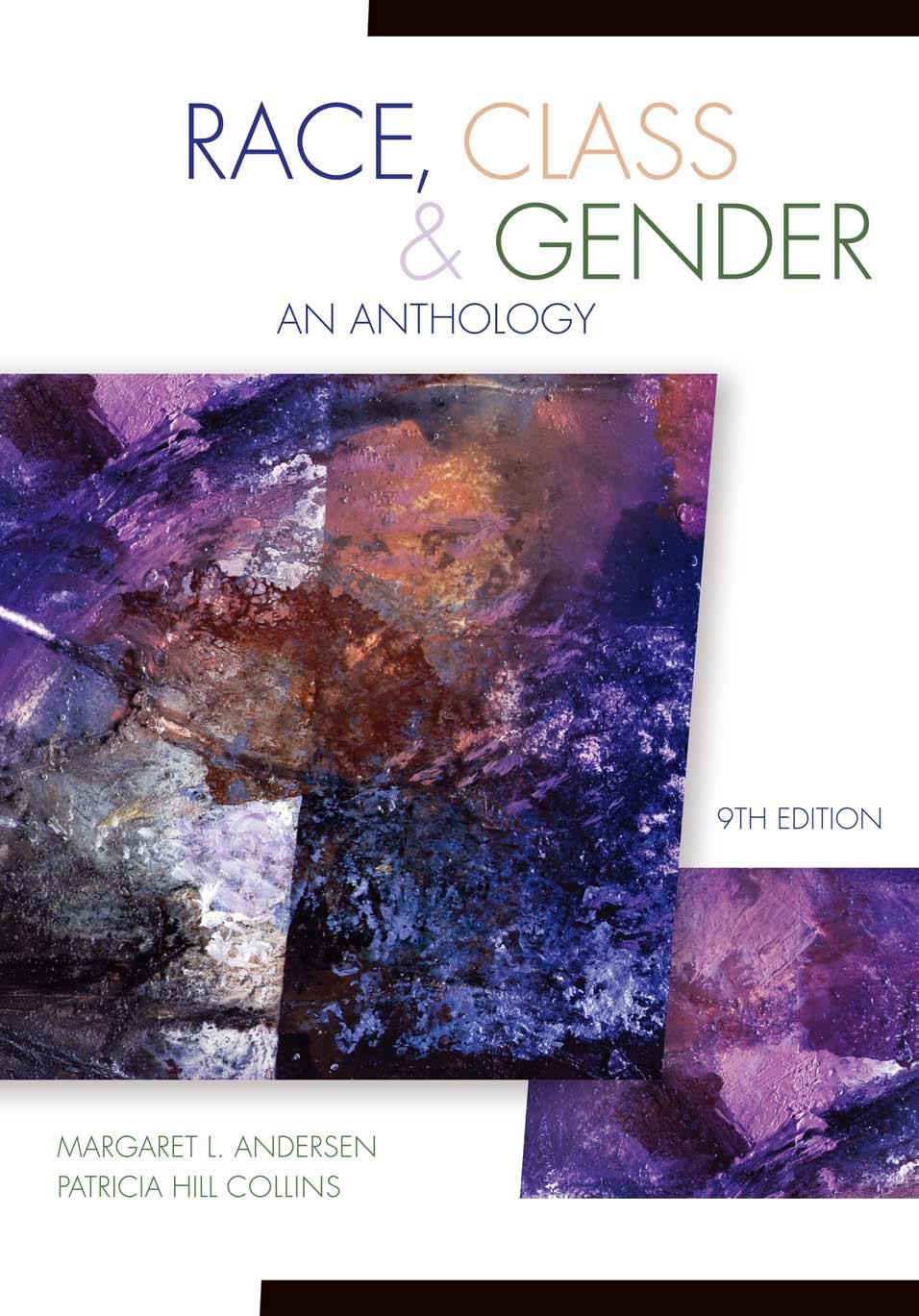Preface
Wewritethisprefaceatatimewhenthesocialdynamicsofrace,class,and genderarechanging.Manybelievethatracenolongermattersasapredictorofone’schancesinlife.Afterall,theUnitedStateselectedaBlackpresident,somethingthatwouldhavebeenunimaginablenotthatmanyyearsago. Somewouldarguethatsocialclassmattersmorethanrace,especiallygiventhe presenceofanAfricanAmericanandLatinomiddleclass.Womenarenow CEOsofmajortechnologycompanies.Yet,thesevisiblesignsofchangemay cloakthesimultaneouspresenceofhighlysegregatedBlackandLatinocommunities,manyofthemstrugglinginthefaceofpoverty.Themiddleclass,longthe hallmarkofourdemocraticsociety,strugglestokeepafirmfootholdinthe Americaneconomy.Althoughwomenatthetoparedoingverywell,themajorityofwomenstillstrugglewithlowwagesandthechallengeofworkingand supportingtheirfamilies,oftenontheirown.
TheU.S.economy,thoughrecoveringsomewhatfromthefinancialcrisis thatbeganin2009,hasalsoleftmanypeopleinfinancialdistress.Peoplewho hadworkedtheirentireliveshaveseentheirlife’ssavingsdisappearastheir housesdroppedinvalueandtheirsavingsaccountsforsendingtheirkidstocollegeorfortheirownretirementshrank.Homelessnesscontinuestomarkour citystreets.Evencollegestudents,whomyoumightthinkofasimmuneto globaleconomictrends,areseeingrisingtuitioncostsasstatesreducetheirsupportforpubliceducation.Debtandeconomicuncertaintyaretheresult.
Noteveryoneexperiencesthesechangesinthesameway.Toexplain people’slifesituationsrequiresunderstandinghowrace,class,andgendershape theAmericanopportunitystructure.Howarerace,class,andgendersystematicallyinterrelated,andwhatistheirrelationshiptoothersocialfactors?
Thatisthethemeofthisbook:howrace,class,andgendersimultaneously shapesocialissuesandexperiencesintheUnitedStates.Centraltothebookis theideathatrace,class,andgenderareinterconnectedandthattheymustbe understoodasoperatingtogetherifyouwanttounderstandtheexperiencesof
diversegroupsandparticularissuesandeventsinsociety.Wewantthisbookto helpstudentsseehowthelivesofdifferentgroupsdevelopinthecontextoftheir race,class,andgenderlocationinsociety.
Sincethepublicationofthefirsteditionofthisbook,thestudyofrace,class, andgenderhasbecomemuchmorepresentinpeople’sthinking.Overtheyears thatthisbookhasbeenpublished,therehasalsobeenanenormousgrowthin theresearchscholarshipthatisanchoredinanintersectionalframework.Still, peoplecontinuetotreatrace,class,andgenderinisolationfromtheothers; somealsotreatrace,class,andgenderasiftheywereequivalentexperiences. Althoughweseethemasinterrelated andsometimessimilarinhowthey work wealsounderstandthateachhasitsowndynamic,butadynamicthat canonlybetrulyunderstoodinrelationshiptotheothers.Withthegrowthof race,class,andgenderstudies,wecanalsonowbetterunderstandhowother socialfactors,suchassexuality,nationality,age,anddisability,areconnectedto thesocialstructuresofrace,class,andgender.Wehopethatthisbookhelpsstudentsunderstandhowthesestructuralphenomena thatis,thesocialforcesof race,class,andgenderandtheirconnectionwithothersocialvariables are deeplyembeddedinthesocialstructureofsociety.
Thisanthologyis,thus,morethanacollectionofreadings.Ourbookis stronglycenteredinananalyticalframeworkabouttheinterconnectionsamong race,class,andgender.Inthiseditionwecontinueoureffortstofurtherdevelop aframeworkofthe intersectionality ofrace,class,andgender,orasPatriciaHill Collinshaslabeledit,the matrixofdomination. Theorganizationofthebookfeaturesthisframework.Ourintroductoryessaydistinguishesanintersectional frameworkfromothermodelsofstudying “difference.” Thefourpartsofthe bookareintendedtohelpstudentsseetheimportanceofthisintersectional framework,toengagecriticallythecoreconceptsonwhichtheframeworkis based,andtoanalyzedifferentsocialinstitutionsandcurrentsocialissuesusing thisframework,includingbeingabletoapplyittounderstandingsocialchange.
ORGANIZATIONOFTHEBOOK
Thefourmajorpartsofthebookreflectthesegoals.Weintroduceeachofthe fourpartswithanessaywewrotetoanalyzetheissuesraisedbythereading selections.Theseessaysareanimportantpartofthisbookbecausetheyestablish theconceptualfoundationthatweusetothinkaboutrace,class,andgender.
Asinpasteditions,weincludeessaysinPartI(“WhyRace,Class,and GenderStillMatter”)thatengagestudentsinpersonalnarratives,asawayof helpingthemstepbeyondtheirownsociallocationandtoseehowrace,class, gender,sexuality,andothersocialfactorsshapepeople’slivesdifferently.Inthis edition,wehavealsoincludedsomeofthenowclassicpiecesinintersectional studies,andweincludetwopiecesthatprovidesomehistoricalfoundationfor howrace,class,andgenderhaveevolvedinAmericansociety.Wewantthis sectiontoshowstudentstheverydifferentexperiencesthatanchorthestudyof
race,class,andgender.Wethereforebeginourbookwithessaysthatshowtheir continuing,evenifchanging,significance.
PartII, “SystemsofPowerandInequality,” providestheconceptualfoundationforunderstandinghowrace,class,andgenderarelinkedtogetherandhow theylinkwithothersystemsofpowerandinequality,especiallyethnicityand sexuality.Herewewantstudentstounderstandthatindividualidentitiesand experiencesarestructuredbyintersectingsystemsofpower.TheessaysinPartII linkethnicity,nationality,andsexualitytothestudyofrace,class,andgender. Wetreateachoftheseseparatelyhere,notbecausewethinktheystandalone, buttoshowstudentshoweachoperatessotheycanbetterseetheirinterlocking nature.Theintroductoryessayprovidesworkingdefinitionsforthesemajorconceptsandpresentssomeofthecontemporarydatathatwillhelpstudentsseehow race,class,andgenderstratifycontemporarysociety.
PartIII, “TheStructureofSocialInstitutions,” examineshowintersecting systemsofrace,class,andgendershapetheorganizationofsocialinstitutions andhow,asaresult,theseinstitutionsaffectgroupexperience.Socialscientists routinelydocumenthowLatinos,AfricanAmericans,women,workers,and otherdistinctivegroupsareaffectedbyinstitutionalstructures.Weknowthisis truebutwanttogobeyondtheseanalysestoscrutinizehowinstitutionsare themselvesconstructedthroughrace,class,andgenderrelations.Ascategories ofsocialexperience,race,class,andgendershapeallsocialinstitutionsandsystemsofmeaning.Inthiseditionwehaveaddedanewsectionon “Bodies, Beauty,andSports” toanalyzetheinstitutionsthatshapethebodilyexperiences ofpeople,especiallyyoungerpeople.
WehaverevisedPartIV, “AnIntersectionalFrameworkforChange:From theLocaltotheGlobal,” toshowstudentstheverydifferentcontextsinwhich anintersectionalperspectivecaninformsocialpractices.Manyanthologiesuse theirfinalsectiontoshowhowstudentscanmakeadifferenceinsociety,once theyunderstandtheimportanceofrace,class,andgender.Wethinkthisisatall orderforstudentswhomayhavehadonlyafewweekstobeginunderstanding howrace,class,andgendermatter andmattertogether.Byshowingthedifferentcontextsforsocialchange rangingfromgroup-basededucationincounselingtoglobaltransformation wehopetoshowstudentshowanintersectional frameworkcanshapeone’sactioninbothlocal,national,andglobalcontexts.
Thisbookisgroundedinasociologicalperspective,althoughthearticles comefromdifferentperspectives,disciplines,andexperiences.Severalarticles provideahistoricalfoundationforunderstandinghowrace,class,andgender haveemerged.Wealsoincludematerialsthatbringaglobaldimensiontothe studyofrace,class,andgender notjustbylookingcomparativelyatotherculturesbutalsobyanalyzinghowglobalizationisshapinglifeintheUnitedStates.
Notallarticlesaccomplishthisasmuchaswewouldlike,butwetrynotto selectarticlesthatfocusexclusivelyononeissuewhileignoringtheothers.Inthis regard,ourbookdifferssignificantlyfromotheranthologiesonrace,class,and genderthatincludemanyarticlesoneachfactor,butdolesstoshowhowthey areconnected.Wealsodistinguishourbookfromthosethatarecenteredina multiculturalperspective.Althoughmulticulturalismisimportant,wethinkthat
race,class,andgendergobeyondtheappreciationofculturaldifferences.Rather, weseerace,class,andgenderasembeddedinthestructureofsocietyandsignificantlyinfluencinggroupculturesandopportunities.Race,class,andgenderare structuresofgroupopportunity,power,andprivilege,notjustculturaldifferences.Wesearchforarticlesthatareconceptuallyandtheoreticallyinformed andatthesametimeaccessibletoundergraduatereaders.Althoughitisimportanttothinkofrace,class,andgenderasanalyticalcategories,wedonotwantto losesightofhowtheyaffecthumanexperiencesandfeelings;thus,weinclude personalnarrativesthatarereflectiveandanalytical.Wethinkthatpersonal accountsgenerateempathyandalsohelpstudentsconnectpersonalexperiences tosocialstructuralconditions.
Weknowthatdevelopingacomplexunderstandingoftheinterrelationships betweenrace,class,andgenderisnoteasyandinvolvesalong-termprocess engagingpersonal,intellectual,andpoliticalchange.Wedonotclaimtobe modelsofperfectioninthisregard.Wehavebeenpleasedbythestrongresponse tothefirsteighteditionsofthisbook,andwearefascinatedbyhowrace,class, andgenderstudieshavedevelopedsincethepublicationofourfirstedition.We knowfurtherworkisneeded.Ourownteachingandthinkinghasbeentransformedbydevelopingthisbook.Weimaginemanychangesstilltocome.
NEWTOTHENINTHEDITION
Intheyearssincerace/class/genderstudiesfirstevolved,alargeandgrowing bodyofscholarshipandactivismhasemergedutilizingthisinclusiveperspective. Suchworkmakesthejobofassemblingthiscollectionbotheasierandharder:It iseasierbecausethereismoreintersectionalworktochoosefrom,butharder becauseofhavingtomakedifficultdecisionsaboutwhattoinclude.Asinearlier editions,wehaveselectedarticlesbasedprimarilyontwocriteria:(1)accessibility toundergraduatereadersandthegeneralpublic,notjusthighlytrainedspecialists;and,(2)articlesthataregroundedinrace and class and gender inother words,intersectionality.
Wehavemadeseveralchangesintheninthedition,includingthefollowing:
■ 31newreadings;
■ anewsectiononbodies,beauty,andsports;
■ acompletelyrevisedfinalsectionfocusingonintersectionalchangeindifferentcontexts;
■ morereadingswithaglobalframework;
■ moreempiricalresearchframedbyanintersectionalanalysis;
■ continuedfocusonthemediaandpopularculture,butnewreadingson youth,socialnetworking,andtheInternet;
■ fourrevisedintroductions,oneofthenotedstrengthsofourbookcompared toothers;and,
■ newmaterialonrace,class,andgenderbasedonimportantcurrentissues, includingimmigration,socialmedia,policeinpoor,urbancommunities, growinginequality,whiteprivilege,sexuality,jobs,familyleave,school segregation,disabilitystudies,andfoodsustainability.
PEDAGOGICALFEATURES
Werealizethatthecontextinwhichyouteachmatters.Ifyouteachinaninstitutionwherestudentsaremorelikelytobeworkingclass,perhapshowtheclass systemworkswillbemoreobvioustothemthanitisforstudentsinamore privilegedcollegeenvironment.Manyofthosewhousethisbookwillbeteachinginsegregatedenvironments,giventhehighdegreeofsegregationineducation.Thus,howoneteachesthisbookshouldreflectthedifferentenvironments wherefacultywork.Ideally,thematerialinthisbookshouldbediscussedina multiracial,multiculturalatmosphere,butwerealizethatisnotalwaysthecase. Wehopethatthecontentofthebookandthepedagogicalfeaturesthatenhance itwillhelpbringamoreinclusiveanalysistoeducationalsettingsthanmightbe theretostartwith.
Weseethisbookasmorethanjustacollectionofreadings.Thebookhasan analyticallogictoitsorganizationandcontent,andwethinkitcanbeusedto formatacourse.Ofcourse,somefacultywillusethearticlesinanorderdifferent fromhowwepresentthem,butwehopethefourpartswillhelppeopledevelop theframeworkfortheircourse.Wealsoprovidepedagogicaltoolstohelp peopleexpandtheirteachingandlearningbeyondthepagesofthebook. Wehaveincludedfeatureswiththiseditionthatprovidefacultywithadditionalteachingtools.Theyincludethefollowing:
■ Instructor’smanual. Thiseditionincludesaninstructor’smanualwithsuggestionsforclassroomexercises,discussionandexaminationquestions,and courseassignments.
■ Index. Theindexwillhelpstudentsandfacultylocateparticulartopicsinthe bookquicklyandeasily.
■ CengageLearningTesting,poweredbyCogneroInstantAccess.Thisisaflexible, onlinesystemthatallowsyoutoauthor,edit,andmanagetestbankcontent frommultipleCengageLearningsolutions;createmultipletestversionsinan instant;anddelivertestsfromyourLMS,yourclassroom,orwhereveryou want.
Reconstructingexistingwaysofthinkingtobemoreinclusiverequiresmany transformations.Onetransformationneededinvolvesthelanguageweuse whenreferringtodifferentgroups.Languagereflectsmanyassumptionsabout
race,class,andgender;andforthatreason,languagechangesandevolvesas knowledgechanges.Theterm minority, forexample,marginalizesgroups,makingthemseemsomehowoutsidethemainstreamordominantculture.Even worse,thephrase non-White, routinelyusedbysocialscientists,definesgroups intermsofwhattheyarenotandassumesthatWhiteshavetheuniversalexperiencesagainstwhichtheexperiencesofallothergroupsaremeasured.Wehave consciouslyavoidedusingbothofthesetermsthroughoutthisbook,although thisissometimesunavoidable.
WehavecapitalizedBlackinourwritingbecauseofthespecifichistorical experience,variedasitis,ofAfricanAmericansintheUnitedStates.Wealso capitalizeWhitewhenreferringtoaparticulargroupexperience;however,we recognizethatWhiteAmericanisnomoreauniformexperiencethanisAfrican American.Weuse Hispanic and Latina/o interchangeably,thoughwerecognize thatisnothowgroupsnecessarilydefinethemselves.Whencitingdatafrom othersources(typicallygovernmentdocuments),weuse Hispanic becausethatis usuallyhowsuchdataarereported.
Languagebecomesespeciallyproblematicwhenwewanttotalkaboutfeaturesofexperiencethatdifferentgroupsshare.UsingshortcuttermslikeHispanic,Latina/o,NativeAmerican,andwomenofcolorhomogenizesdistinct historicalexperiences.Eventheterm White falselyunifiesexperiencesacross suchfactorsasethnicity,religion,class,andgender,tonameafew.Attimes, though,wewanttotalkofcommonexperiencesacrossdifferentgroups,sowe haveusedlabelssuchasLatina/o,AsianAmerican,NativeAmerican,and womenofcolortodoso.Unfortunately,describinggroupsinthiswayreinforces basiccategoriesofoppression.Wedonotknowhowtoresolvethisproblembut wantreaderstobeawareofthelimitationsandsignificanceoflanguageasthey trytothinkmoreinclusivelyaboutdiversegroupexperiences.
ACKNOWLEDGMENTS
Ananthologyrestsontheeffortsofmorepeoplethantheeditorsalone.This bookhasbeeninspiredbyourworkwithscholarsandteachersfromaround thecountrywhoareworkingtomaketheirteachingandwritingmoreinclusive andsensitivetotheexperiencesofallgroups.Overtheyearsofourowncollaboration,wehaveeachbeenenrichedbytheworkofthosetryingtomakehigher educationamoreequitableandfairinstitution.Inthattime,ourworkhasgrown frommanynetworksthathavegeneratednewrace,class,andgenderscholars. Theseassociationscontinuetosustainus.Manypeoplecontributedtothedevelopmentofthisbook.WeespeciallythankD.StanleyEitzen,MaxineBacaZinn, ElizabethHigginbotham,ValerieHans,andtheBostonAreaFeministScholars Groupfortheinspiration,ideas,suggestions,andsupport.
Weappreciatethesupportgivenbyourinstitutions,withspecialthanksto PresidentPatrickHarker,VicePresidentPatriciaWilson,andExecutiveVice PresidentScottDouglassoftheUniversityofDelawareforprovidingthe
financialsupportthatsupportedDanaAlvaretoassistwiththisedition.Many thanksgotoDanaforhelpingsomuchwiththisedition.Thankyouaswellto Delaware’sProvostDomenicoGrassoforsupportingthescholarshipofhissenior administration.AveryspecialthanksgotoJudyAllarey,DanaBrittingham, SandyBuchanan,SarahHedrick,RitaScott,JoanStock,andSusanWilliams forthehelpandgoodcheerthattheyprovideeveryday;theireffortsmakethe taskofbalancinganadministrativejobandwritingmuchmorepossibleand enjoyable.
WethanktheteamatCengagefortheirencouragementandsupportforthis project.Mostparticularly,wethankLoriBradshawforexpertlyoverseeingallof theproductiondetails.Wealsothanktheanonymousreviewerswhoprovided valuablecommentaryontheprioreditionandthushelpedenormouslyinthe developmentoftheninthedition.
Thisbookhasevolvedovermanyyearsandthroughitallwehavebeen luckytohavetheloveandsupportofRichard,Roger,Valerie,andLauren. Wethankthemfortheloveandsupportthatanchorsourlives.And,withthis edition,wewelcomeAubreyEmmaHanerfeldandHarrisonCollinsPruittwith hopesthattheworldstheyencounterwillbejust,andinclusive,helpingthem thriveinwhateverpathstheytake.
AbouttheEditors
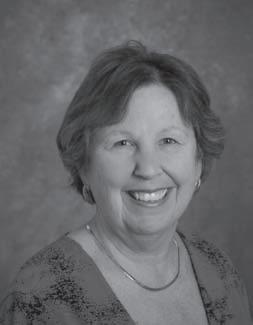
MargaretL.Andersen (B.A.GeorgiaState University;M.A.,Ph.D.,UniversityofMassachusetts,Amherst)istheEdwardF.and ElizabethGoodmanRosenbergProfessorof SociologyattheUniversityofDelaware whereshealsoholdsjointappointmentsin BlackAmericanStudiesandWomen’sStudies; shehasalsoservedastheViceProvostfor FacultyAffairsandDiversity.Shehasreceived twoteachingawardsattheUniversityofDelaware.Shehaspublishednumerousbooksand articles,including ThinkingaboutWomen:SociologicalPerspectivesonSexandGender (10thed., Pearson,2015); RaceandEthnicityinSociety:The ChangingLandscape (editedwithElizabethHigginbotham,3rded.,Cengage, 2012); OnLandandOnSea:ACenturyofWomenintheRosenfeldCollection (Mystic SeaportMuseum,2007); LivingArt:TheLifeofPaulR.Jones,AfricanAmericanArt Collector (UniversityofDelawarePress,2009);and Sociology:TheEssentials (coauthoredwithHowardF.TaylorandKimLogio;Cengage,2014).Shereceived theAmericanSociologicalAssociation’sJessieBernardAwardforexpandingthe horizonsofsociologytoincludethestudyofwomenandtheEasternSociological Society’sMeritAwardandRobinWilliamsLecturerAward.Sheisapastvice presidentoftheAmericanSociologicalAssociationandpastpresidentofthe EasternSociologicalSociety.
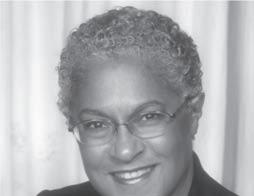

PatriciaHillCollins (B.A.,BrandeisUniversity; M.A.T.,HarvardUniversity;Ph.D.,Brandeis University)isdistinguisheduniversityprofessor ofsociologyattheUniversityofMaryland, CollegePark,andCharlesPhelpsTaftEmeritus ProfessorofAfricanAmericanStudiesandSociologyattheUniversityofCincinnati.Sheisthe authorofnumerousarticlesandbooksincluding OnIntellectualActivism (TempleUniversity, 2013), AnotherKindofPublicEducation:Race, Schools,theMediaandDemocraticPossibilities (Beacon,2009), FromBlackPowertoHipHop: Racism,NationalismandFeminism (TempleUniversity,2006); BlackSexualPolitics:African Americans,GenderandtheNewRacism (Routledge,2004),whichwontheDistinguishedPublicationAwardfromtheAmericanSociologicalAssociation; Fighting Words (UniversityofMinnesota,1998);and BlackFeministThought:Knowledge, Consciousness,andthePoliticsofEmpowerment (Routledge,1990,2000),whichwon theJessieBernardAwardoftheAmericanSociologicalAssociationandthe C.WrightMillsAwardoftheSocietyfortheStudyofSocialProblems.In 2008–2009,sheservedasthe100thpresidentoftheAmericanSociological Association.
Another random document with no related content on Scribd:
“My dear Wilfrid!” cries his aunt. “How altruism does sour the temper!”
“Temper! I hope I have too much philosophy to allow my temper to be ruffled by the clumsy horse-jokes of my acquaintances.”
“But why are you always at home to these Browns?” Bertram hesitates.
“Are they acolytes? studies? pensioners?” asks his aunt.
“Is the respectable one pretty?” murmurs Marlow. “The respectable ones so uncommonly rarely are!”
He takes the violets off the cloisonnéplate.
“A buttonhole to be worn at Hoxton Theatre? It is an emblem of the immorality of finance: for its commercial value must be at least four farthings. If my Waterbury offend the eye of eternal justice this penny bunch must outrage it no less.”
“It is quite natural, I think,” says Cicely Seymour, rather impatiently, “that Mr. Bertram should have many friends in those classes which he considers so superior to his own.”
“I do not say any class is superior to any other,” interrupts Bertram. “I say that all are equal.”
There is now a great buzz of voices everywhere in the rooms; people are so very glad to have the muzzle off after an hour’s silence; he cannot doubt, as that murmur and trill of conversation run all round him, that he has bored them all excruciatingly.
“They have no minds!” he thinks, bitterly. “We sell a bare score of copies a month of the Age to Come, and the Dustcart, with its beastly ribaldry and social scandals, sells sixty-five thousand!”
“Do you mean to say, Wilfrid,” asks his aunt, eating a caviare sandwich, “that anybody would pay taxes if they were not obliged?”
“Do not people, urged by conscience, send arrears, unasked, to the Chancellor of the Exchequer?”
“Well, they do certainly now and then. But they must be very oddly constituted people.”
“Is conscience an eccentricity?”
His aunt does not argue, she only shakes her head.
“I can’t believe anybody would pay taxes if they weren’t obliged.”
“But they do. There are these instances in the papers. If moral feeling in the public were acute and universal, as it ought to be, every public duty would be fulfilled with promptitude and without pressure.”
The old duke nods very expressively.
“Your aunt’s right,” he mumbles. “Conscience-money can only come from cranks!”
“Come and dine with us, Wilfrid,” says his aunt; “we never see you now. I assure you a good dinner changes the colour of political opinions in a wonderful degree. I am dreadfully afraid that you have been living on boiled soles and carrot fritters.”
Bertram smiles slightly. “The carrot fritters; not the soles. I am a vegetarian.”
“But we are justified in being carnivorous,” says Southwold, very eagerly. “Individualism justifies us.”
Marlow repeats with emphasis: “We are justified in being carnivorous. Individualism justifies us.”
“Certainly,” says Bertram, with uncivil sarcasm. “The crocodile has a right to its appetites, and the cur to its vomit. Solomon said so.”
“Am I the crocodile or the cur?” asks Southwold.
“Do you keep Critchett on carrot fritters?” asks Marlow, “and what does he have to drink? Hot water? Hot water is, I believe, the beverege which nowadays accompanies high thinking.”
“And how do you reconcile your conscience and your creeds to keeping a Critchett at all?” repeats Lady Jane.
Bertram replies with distant chillness and proud humility: “The leaven of long habit is hard to get rid of; I entirely agree with you that I am in the wrong. To have a servant at all is an offence to humanity; it is an impertinence to the brotherhood of our common mortality.”
“Don’t be afraid,” says Southwold, grimly, “our brothers and sisters in the servants’ halls pay us out for the outrage; they take away our characters, read our correspondence, and pocket twenty per cent. on all our bills.”
“Can you blame them? They are the product of a corrupt society. No one can blame them, whatever they are or do. The dunghill cannot bring forth the rose. Your service has debased them. The fault of their debasement lies with you.”
“But Critchett cannot be debased. He must, living in so rarefied a moral atmosphere, be elevated above all mortal weaknesses.”
Bertram replies stiffly: “I can assure you I have much more respect for Critchett than for any member of a St. James’ Street club.”
“And yet you give him carrot fritters!” cried Lady Southwold.
Bertram replies with great irritation: “He eats whatever he pleases, turtle and turbot for aught I know. I should never presume to impose upon him either my menu or my tenets, my beliefs or my principles.”
“You do wisely if you wish to keep him!” says his aunt. “I hope you willkeep him. He is your only link with civilised life.”
Bertram smiles. “My dear aunt, when I was in the South Pacific I landed at a small island where civilisation was considered to consist in a pierced nose and a swollen belly. I do not want to be offensive, but the estimate which my age takes of its own civilisation is not very much more sensible.”
“I think it would have been better, Wilfrid, to study psychology under these savages than to publish the AgetoCome! You could not have injured them, but here——”
“How illiberal you are, dear Lady Southwold,” says Cicely Seymour. “You want a course of Montaigne.”
“What’s that, Miss Seymour?” asks Marlow. “A rival to Mariani wine?”
“Yes, a French wine; very old and quite unequalled!”
Even Bertram laughs. Marlow is irritated. He does not see what he has said which is so absurd, or why his friends are laughing.
“Why do you always take that prig’s part?” he mutters, sullenly, aside to Cicely Seymour.
“I do not take any one’s part,” replies the young lady; “but I detest injustice and illiberality.”
At this moment the old duke rises with Bertram’s help, is assisted by him to find his hat and stick, and takes his departure, assuring his godson that he had been much entertained.
Following the duke’s example every one takes their leave, assuring their instructor that they have derived much entertainment and information from his disquisition. Cicely Seymour says simply and very gently: “Thanks, Mr. Bertram. You have made me your debtor for many noble thoughts.”
When they have left him Bertram walks up and down his rooms dissatisfied with himself.
“What a coward!” he thinks, with the moral self-flagellation of an over-sensitive and over-sincere person. “Why could I not tell them the truth? Why did I limit myself to saying that she was a perfectly respectable young woman? If I cannot face the simple enunciation of the intention, how shall I ever bring myself to the endurance of publishing the fact when it is accomplished? Am I, after all, the slave of opinion, like anybody else? Am I afraid of a set of fools who are capering on their primrose path, seeing nothing of the abyss to which it leads? If I have not the courage of my views and faiths, wherein am I superior to their philistinism? I do what I choose; what I see to be wise and right and just; I desire to give an example which shall show how utterly I despise the fictitious barriers of caste
and custom, and yet I have not courage enough to say to a few people who are drinking tea in my rooms, ‘My good folks, I am going to marry a young woman called Annie Brown.’ Why could I not say it? Why was I such a miserable poltroon?”
He throws himself into a deep chair and lights a cigarette.
“What would my aunt have done? What would that grinning cad Marlow have said? What would Cicely Seymour have thought? Perhaps she would have approved. She has more sympathy, more insight than the others—and what a charming profile! And those deep blue eyes under those long thick lashes; they are eyes which have mind in them as well as youth and smiles and innocence; they are eyes which will be still beautiful when she is seventy and her hair is white under a lace mob-cap or a black satin hood. What colour are Annie’s eyes? They are round and small, of no particular colour, I think; a reddish grey. Dear good little girl, it was not for her beauty that I selected her.”
Critchett opens the door at that moment, and breaks in on his reflections.
“Mr. Fanshawe, sir.”
A gentleman of no definite age, with a shrewd countenance and a significant smile, crosses the room with outstretched hand.
“My dear Wilfrid, they tell me you are in a wax about the exceptions I took to your article. I am extremely sorry to touch any single line of yours, but B.P. must be considered, you know. You are miles too advanced for this inviolate isle; she is still shuddering at the fright which Guy Fawkes gave her.”
Bertram replies stiffly: “I have certainly no affinity to Guy Fawkes, who was a religious person and a strict monarchist. As for the essay, pray do not trouble yourself; I shall publish it in the AgetoCome.”
“Oh, that’s a pity; that will be practically putting it into the wastepaper basket; excuse me saying so, but you know the circulation of the AgetoComeis at present—is—well—limited.”
“We certainly do not chronicle scandals of the hunting-field, and devote columns to prophesying the shape of next year’s bonnets, as the Torchdoes!”
“That shows you don’t understand your public, or don’t want to secure one. Extreme opinions, my dear boy, can only be got down the throats of the world in a weekly journal by being adroitly sandwiched between the caviare of calumny and the butter of fashion. People hate to be made to think, my dear boy. The Age to Come gives ’em nothing but thinking; and damned tough thinking too. You write with uncommon power, but you are too wholesale, too subversive; you scare people so awfully that they stop their ears to your truths. That is not the way to secure a hearing.”
“I am consistent.”
“Oh, Lord! Never be consistent. There’s nothing so unpopular in life.”
“I despise popularity.”
“You despise bread and butter. I believe you lose twenty pound a month by your AgetoCome?”
“To speak more correctly,” replies Bertram, bitterly, “it gets me into debt to that amount!”
“Heaven and earth! Why don’t you drop it?”
“It is a matter of principle.”
“Principle which will land you in Queer Street. Now, my dear Wilfrid, no man thinks more things bosh than I do, or takes more pleasure in saying so, but I combine pleasure with business; I say my say in such a way that it brings me in eighty per cent.”
Bertram looks at him derisively.
“I have always known that your intellect was only equalled by your venality!”
Fanshawe laughs good-humouredly.
“That is neat. That is soothing. It is not difficult to understand that you are not considered a clubbable man! However, as you credit me with intellect, I don’t mind your denying me morality. But seriously, my dear friend, you are much too violent, too uncompromising for success in journalism. Who tries to prove too much fails to prove anything, and when you bend your bow too violently it snaps and speeds no arrow. I confess that I (who am as revolutionary as most people and always disposed to agree with you) do frequently get up from the perusal of one of your articles with the unwilling conviction that it is best to let the old order of things alone. Now, that is certainly not the condition of mind which you wish to produce in your readers.”
Bertram is silent. After a pause he says:
“What do you advocate, then? A cautious trimming?”
“Trimming was the name which the eighteenth-century politician gave to what we now call opportunism. All sagacious men are not opportunists, but all sagacious men endeavour to create supporters, not antagonists. Now, all violent assertion raises opposition, for human nature is cantankerous and contradictory.”
Critchett enters and hands a card on a salver. “If you please, sir, the gentleman’s waiting below; says he sent you a letter two days ago; gentleman’s head of the firm of Folliott and Hake, sir.”
Bertram looks vaguely about the room. “There are a good many letters unopened. I wonder which it is?”
Fanshawe catches up a pile of letters from a writing-table and sorts them: “Here’s one with ‘Folliott and Hake’ on the seal; how unpractical you are, dear boy!”
Bertram takes the letter and looks at it without curiosity. “It is sure to be something unpleasant. I never heard of Folliott and Hake.”
Fanshawe laughs. “I have; many a time. They have been solicitors in more than one libel case, of which the Torchwas defendant. Come, open the letter. See what it says.”
Bertram opens and reads it: “Only that they have a matter of great importance to communicate to me. I really have no idea what it can be. People think so many things important which are of infinitesimal insignificance.”
“You will best correct your ignorance by allowing Mr. Folliott to enter and explain himself.”
“I am so opposed to all lawyers on principle.”
“So am I, as I am opposed to small-pox, or bicycle riders, or yellow fogs; but they are not to be avoided in this life, and it is neither polite or politic to keep these highly respectable solicitors waiting like sweeps. Critchett, beg Mr. Folliott to enter. I will leave you, Bertram.”
“No, no; for goodness’ sake stay. I may want some advice.”
“You not unfrequently do. But you never follow it when given. Pray be civil.”
A few moments later Mr. Folliott enters; a bland, white-haired, portly old gentleman, a little ruffled at having been left so long at the foot of the stairs.
“I beg your pardon, Mr.—Mr.—Folliott,” says Bertram, looking at the letter. “I had, in fact, not opened this note of yours. It is a bad habit I have of leaving letters unread.”
“It was Sheridan’s, sir,” says the lawyer, pointedly. “It did not bring him good fortune.”
He catches sight of Fanshawe, and his amiable countenance assumes the startled and displeased expression of a cat’s face, when the cat suddenly perceives a bull terrier.
“I naturally awaited you, Mr. Bertram, or a communication from you, all the day,” he says, in an affronted tone. “Hearing nothing I thought it best to come myself. You are perhaps unaware that the Prince of Viana is dead.”
“I never heard of the individual,” says Bertram. “Who was he?”
“He was your first cousin. You may know him better as the son of Mr. Horace Errington.”
“Oh! The son of my mother’s brother? We never knew him. There was a family feud.”
“But you will remember to have heard that his father made great wealth in the Abruzzi through copper mines, was nationalised, and was ennobled by Victor Emmanuel. The family feud was chiefly on account of his connection with commerce and his change of country.”
“Precisely.”
“I regret to inform you that your cousin is dead, at thirty-three years of age, killed by a wild boar when hunting in the Pontine marshes; he has left you, Mr. Bertram, his sole and exclusive heir.”
Bertram stares at him.
“What! you must be joking, Mr. Folliott!”
The old gentleman takes off his gold spectacles and puts them on again in extreme irritation.
“I am not in the habit of joking, sir, either in business or outside it. We were solicitors to his father and to himself. We drew up this will five years ago. You are inheritor of an immense fortune, Mr. Bertram.”
Bertram stands staring at him, then turns to Fanshawe. “Do you hear? Is it true? Surely, no one could insult me so greatly, even in jest?”
“I really do not understand,” says the lawyer, bewildered. “What insult can there be? I am speaking, sir, in most sober earnest.”
“Shall I fan you, Wilfrid? or send for some sal volatile?” says Fanshawe, derisively. “Don’t be an ass,” he adds in a whisper. “This sensible old fellow will think it his duty to shut you up in a private mad-house, if you talk like that. Pull yourself together, and answer him sensibly.”
Mr. Folliott surveys the speaker as a timid person may look at a lion riding on a velocipede in a circus-ring.
“If Mr. Bertram would place me in communication with his solicitor matters would be facilitated,” he murmurs.
“I have no solicitors,” replies Bertram. “If you will pardon what may seem an offensive opinion, I regard all men of law as poisonous parasites growing on the rotten trunk of a society which has the axe of retribution laid at its roots.”
Mr. Folliott is too astonished to be offended: “I fail to follow you, sir, but I have no doubt you mean something very profound. Your cousin did not, I imagine, read your articles in the reviews, but I have read one or two of them. However, notwithstanding your extraordinary opinions, you are a man of birth and breeding, and must, in a measure, be a man of the world, sir. You must know that you must allow me to fulfil my office. This will has to be proved and probate taken out.”
“Where is the necessity?”
“Be so good as not to play with me. You must accept the inheritance or decline it. In event of your refusal, of your formal and final refusal, the whole of this property is to go to the testator’s old college at Oxford—Magdalen College.”
“Ah! that is a consolation.”
“Why so, sir?”
“Because, although I have no sympathy with the modern movements at Oxford, and consider that she has fallen away from her original high mission, yet she is, and always will be, a seat of learning; and the Humanities will never wholly be banished from her halls.”
“Again, I fail to follow you sir.”
“I mean that such an alternative destination for the property will enable me to decline it with a clear conscience.”
“Really, sir, your replies are wholly unintelligible.”
Bertram turns helplessly to Fanshawe. “Explain to this gentleman my views regarding property.”
“I am aware of some of them, sir,” replies the solicitor, sententiously.
“You read the Torch, Mr. Folliott, don’t you?” says the proprietor of the Torch.
“When my professional duties compel me, sir.”
“But the Torch is milk for lambs, Mr. Folliott, beside the Age to Come.”
The solicitor bows with an expression which indicates that he would prefer to remain unacquainted with the AgetoCome.
“But pardon me,” continues Fanshawe, “is my friend here really so immensely in luck’s way?”
“He inherits under the Prince of Viana’s will all properties, both English and Italian,” replies the lawyer, with the cat’s expression more accentuated on his countenance.
“And they are very large?”
“Very large. My late client was an only son, and though generous, never spendthrift.”
Fanshawe touches Bertram’s arm. “Wake up, Wilfrid. Do you hear? Can’t you speak?”
Bertram says wearily, “What am I to say? It is an unspeakably awful thing. I really cannot bring myself to believe in it.”
“If you will allow me,” says the solicitor, “to make you acquainted with some details of the——”
“To what end? Do the items of the contents of the pack interest the pack-horse to whose aching back the burden is offered?”
“Again I fail to follow you.”
“To follow him, Mr. Folliott,” says Fanshawe, “requires a long course of patient perusal of the AgetoCome.”
“Quite so, quite so,” answers the solicitor, coldly, in a tone which intimates that he will not have that patience. “I have certainly never seen the announcement of an inheritance received in such a manner.”
“But why,” says Bertram—“why did this relative, whom I never knew, leave his property to me?”
“I cannot tell, sir. It was certainly not by the advice of our firm.”
“Are there any conditions attached to this extraordinary bequest?”
“None, sir. You can realise at once and invest everything in dynamite and pyretic acid,” replies the solicitor, with a rasping scorn showing through the velvet of his admirable manners.
“Oh, my dear sir! Can you fall into the vulgar error of confounding collectivism and altruism with anarchy? They are as far apart as the Poles. One is love; the other hatred.”
“I confess, sir, that such love nauseates me. I prefer of the two the hatred. But I am an old-fashioned person, and I know little of literature later than the ’Sixties.”
“A most debased period in every form of production.”
“It may be so. Macaulay was alive in it and Tennyson. But I did not come here to discuss the characteristics of generations. I came to inform you of an event which I immaturely concluded would appear to you both important and agreeable.”
“You did not know me, my dear sir.”
“I did not, sir.”
With a little cough and a little stately bow the old gentleman prepares to leave, with the cat’s glance at the bull terrier still more hostile and more scared.
“You will be so good, sir, as to call on us to-morrow morning, or to send some representative authorised by you. You must be aware that the law requires you either to accept the bequest or decline it.”
“I am criminal if I accept: I may be equally criminal if I reject it.”
“Again I fail to follow you, sir. But of course you are your own master; and in the event of your failure to call on us to-morrow morning you will be so good as to make us acquainted with your decision and intentions.”
“I will send you, Mr. Fanshawe,” replies Bertram.
The solicitor does not look everjoyed at the promise, but bows in silence, a very stiff and formal bow, and leaves the room without more words.
“I am afraid I was not very polite to him,” says Bertram, doubtfully, when the stuffs of the portièrehave fallen behind him.
“You certainly were not,” replies Fanshawe. “I think you could give hints to Whistler on the Gentle Art of making Enemies. But why did you talk all that rot? He only ridiculed you for it.”
“I merely said what I meant.”
“You mean to let this fortune go to Magdalen College?”
“Unless I change my present intentions very completely.”
“Oh, Lord! This is green sickness, moonstruck madness; Hamlet’s monomania was nothing to it. Are you absolutely insensible to the fact that you would be able to print ten million copies of the Ageto Come every week and distribute them gratis all over Great Britain every week?”
“Even that alluring prospect cannot tempt me. My acceptance of a fortune would be as anomalous as Lord Rosebery’s creation of peers. Miserable creatures that we are, we are only tolerably respectable so long as we are commonly consistent.”
“Oh, Lord save us! You can’t possibly be serious?”
“I speak in entire sincerity.”
“A very dangerous thing to do at any time. People have such a shocking habit of taking one at one’s word! Old Folliott’s very shrewd too, though he’s a Tory.”
“What is his shrewdness to me?”
“Well, if you retain him as your man of business it may be a great deal. It is usual to retain the testator’s solicitors when they are as eminent and irreproachable as Folliott and Hake.”
Bertram grows impatient.
“Cannot you understand? I do not take this property. Do not dream of taking it for a single instant!”
“You can’t be such a transcendent ass! Excuse me, but——”
“I should have thought you would have looked at this matter as I do.”
“Dear boy, all property ought to be abolished, on that we are quite agreed, but whilst it still exists in this piggish world we are bound in duty to ourselves and our neighbours to make the best of it, and get as much as we can!”
“Then you are a mere sham? A humbug? A hypocrite?”
“You mean to be rude, but I take no offence. Everybody is insincere in civilised countries.”
“What an infamous theory! I have always thought that your Richmond villa, your house at Prince’s Gate, your swell garden parties, your blood horses, and all the rest of it, were ludicrously out of keeping with your political and literary declarations of opinion.”
“Not more so than your silver tea-set and your exemplary Critchett are with yours. Don’t let us quarrel, at least not until to-morrow. I want to see more of old Folliott. He is one of the worst enemies I have, and I do so delight in drawing the claws of an enemy with my bland and benign manners. Besides, I owe him a good deal. The
Torch was in its infancy when he made its fortune and set it on its legs by his libel suits. Meet me in Hyde Park at eleven to-morrow. I’ll come out of my house through Albert Gate, and we’ll go down to his office together.”
“You can go, and take my written refusal with you.” Fanshawe gives a gesture of irritated impatience, and looks at his watch.
“Lanuitporteconseil.You will think differently in the morning. I am dining at Richmond. I can’t stay another moment, but for Heaven’s sake take till to-morrow to think it over Ta-ta!”
“Good-day.”
Bertram looks out of the window and watches Fanshawe’s private hansom flash down Piccadilly; he vaguely wishes that he too were going to dine at Richmond, and were not fettered by principle to a cheese omelette and a vol au vent of mushrooms.
It is a fine, breezy sunshiny morning on the morrow, good yachting weather, as some one says who is going down to Gravesend for the first cutter race of the season.
Bertram walks along Rotten Row under the trees with a mind so preoccupied that he narrowly escapes being knocked down by an ambassadress on a bicycle. He is repeating to himself what he said to the old duke, “fais ce que dois advienne que pourra,” and he is conscious that the injunction has its thorny side like most other virtuous things.
He has been unable to sleep all night for the tormenting visions evoked by Folliott’s visit and his dead cousin’s bequest.
Because you valorously resist a temptation it does not any the less sharply assail you. Because you limit yourself strictly to rice croquettes you do not the less painfully recall the forbidden flavour of a salmi of game. He considers it no more possible for him in common decency to accept this property than to embrace
Mahomedanism or renounce clothing; but none the less is he haunted by the possibilities that its possession would bring with it.
He is human, and his heart is heavy as he walks along in the pleasant April wind. He realises that there are many charming things which he has renounced—voluntarily renounced, indeed; but, then, is it really more agreeable to kill oneself than to be killed? Anyhow, the result is the same; the grave is as deep and the sleep as eternal.
When he has arrived opposite the residential hotel which raises the colossal offence of its eleven stories between the elm-trees and their right to air and light he sits down, feeling rather limp and aimless; and lighting a cigarette, he awaits the coming of Fanshawe. There is a policeman close at hand; some children are near, with their nurses; and a respectable-looking, middle-aged, brisk woman, with some fine linen in a flat basket, is approaching. He raises his hat to her.
“Is that you, Mrs. Brown? I never saw you in the Park before.”
“No, sir, I don’t often come nigh fine folks,” answers Mrs. Brown. “But I’ve got to go to Prince’s Gate, number fifteen, and I turned in ’ere ’cos the traffic’s that crowded on the ’igh-road; ’is ’Ighness is agoin’ down to ’Ounslow.”
“Oh, to be sure. How are your people this morning?”
“My pore legs, sir, be as bad as ever—but there, we pore folks can’t stop for aches and pains, or we’d never do naught in this ’ere world; ’twasn’t made for the likes of us.”
“That is a sad reflection. But pray don’t say ‘sir’ to me.”
“It comes nat’ral, sir. I hev allus been one as did my humble duty to the quality.”
“Oh, I know! It is this terrible servility which has entered like bloodpoisoning into the very marrow of the people.”
The policeman standing near listening grins behind his white-gloved hand.
“You are so used to stoop and cringe that you have lost the power to stand upright when you are invited to do so,” says Bertram, impatiently. “Where is your daughter?”
“Annie’s at Ealing, sir. It’s Primrose Day to-morrow.”
“And what is your opinion of Primrose Day, Mrs. Brown?”
“Well, sir, it’s got ’em lots o’ votes, but it do seem to me a pack o’ folly. No offence.”
“And the Primrose Dames, Mrs. Brown?”
“Well, sir, they’re a pretty spry lot o’ ladies, and they come and talk, talk, talk, and me at the mangle, and I wish ’em anywheres; and one o’ ’em promised to have my kitchen boiler looked to, but, Lord! that’s three months ago come Monday was a week, and nobody’s come to the boiler.”
“The Conservative party always forgets the boilers; and are extremely astonished when the neglected boilers blow up.”
“My boiler was no business o’ theirs,” says the good woman, hotly; “but if they said they’d send, they hought to hev sent. But there! that’s them ladies all over, in and out, and to and fro, and it’s how’s my soul? and how’s my dust-bin? and hev I faith? and hev I a patent kitchener? and do I read my Bible? and do I keep the traps on my drains? and do I see the blessin’s o’ eddication? and do I keep my sink flushed? and am I an abstainer? and do I use carbolic acid? Such a pack o’ nonsense, and in they comes without rappin’; and if they sees a bit o’ dust in a corner ’tis ‘Lord, Mrs. Brown, don’t ye know as dust is microbes, and microbes is sartain death?’ And I says, says I, ‘No, marm, my leddy, my granny lived to ninety-six, and on her ninetieth birthday she walked four miles to market at Winchester and back, and she allus said to all o’ us as dust was wholesome, and cobwebs too, and shouldn’t ne’er be interfered with ——’”
She stops, out of breath, and the listening policeman smiles again.
“People were more robust in those days, Mrs. Brown,” remarked Bertram.
“Yes, sir, there weren’t so many doctors all over the place. When I was a gal, in our village there weren’t a doctor within twenty mile; and nobody never was ill. Nowadays young and old is allus talking about their livers and lights till they fret theirselves into sickness.”
“That is very possible. Science is much to blame for teaching humanity to concentrate the mind on the body. There I wholly agree with you.”
Mrs. Brown picks up her load of linen, which she has momentarily rested on the back of the bench.
“Well, sir, you’ll please excuse me, but I can’t stand chatterin’ here. We pore has got our work to do. That’s what I says to them ladies when they come botherin.’ I says, says I, ‘We pore has our work to do, and when ’tis done we want to sit still, and put our feet up, and take a cup o’ tea, and doze like; we don’t want to go strammarkin’ about to your concerts, and your readin’s, and your mothers’ meetin’s, and all them rubbishes, and see a duchess playin’ a banjo or hear a duke sing “Hot Codlins.”’ Let ’em keep in their place, and we’ll keep in ours. That’s what I says, sir, and I bring up my children to say it arter me.”
“Oh, I am aware, Mrs. Brown, you and those who resemble you, are a terrible stumbling-block to progress.”
“Please don’t call me names, sir. I’m a pore workin’ woman, but I’m one as hev allus kep’ my head above water. You’re in one speer, and we’re in another, as I hev allus told ye, but all the same I choose to be respecket.”
“My dear creature, no one can respect you more profoundly than I do.”
But Mrs. Brown is not appeased by this assurance; walks away in high dudgeon; there is meanwhile a great noise of yelling and shouting in the distance near the statue of Achilles.
“What are they doing?” Bertram asks of the constable, who, touching his helmet, answers:
“Well, sir, the Salvationists have got new banners, ‘Glory’ on one side, and ‘Eternal Fire’ on t’other; and the pop’lace don’t like ’em. Pop’lace very queer and touchy, sir. Never knows what it wants.”
“That is a hasty condemnation to pass on those who form the bulwarks of a nation.”
“Bulwarks, is it, sir? Not when they’ve got any beer in ’em.”
The uproar in the distance grows very loud indeed; some children are alarmed; the nurse who is with them asks the policeman if there is any danger of a riot.
He replies cheerfully, “No fear, mum. They’re round Hachilles; the Salvationists are on one side, a rum chap hollering against property on the other. He’s one o’ them Communists, and the pop’lace don’t cotton to them ideas; pop’lace likes gentlefolks. Lord! see ’em run to stare at the carriages o’ Drawing Room days!”
“What is the use,” thinks Bertram, “of trying to save sheep who carry their own fleeces obstinately to the shearers?”
“This is the impression,” he asks of the policeman, “which years on the London pavement gives you of the London populace?”
Policeman answers, drily, “Yessir. All the force’ll tell ye the same. London populace likes the nobs. Some on ’em yell a lot o’ revolutionary nonsense when they gets in Trafalgar Square, but, Lord bless ye, they don’t mean it.”
“They will mean it one day.”
“Well, sir, if they ever run short o’ liquor, on account of them total habstainers, they will.”
“What a view of the sovereign people!” says Bertram, “who in the AgetoComeadvocates voluntary total abstinence.”
“Sovereign, is it, sir? Ever seen ’em o’ Derby Day, sir?”
“Yes,” replies Bertram, curtly. He perceives that the constable is a satirist.
In sight at that moment appears a struggling form being violently propelled by two officers of the law, and followed by some yelling roughs and capering boys.
Bertram cannot believe his senses.
“Good gracious! That is Hopper!” he says to the satirical policeman at his side. “What are they doing to him? Why is he arrested?”
Policeman replies politely, but with slightly veiled contempt: “Seem to be running him in, sir. Is he a protegy of yours?”
Bertram goes up to the prisoner: “Why, Hopper, is that you? What has he done? Why do you collar him like that?”
The constables, who are dragging Hopper between them, reply with curt contempt: “Disorderly; drunk and disorderly, that’s what he is, sir, and incitin’ to crime.”
“Drunk?” repeats Bertram. “Hopper? Impossible! He has touched nothing but lemonade and mineral water for three years!”
“Is that so, sir? Well, there’s an excuse for him, then, poor devil!”
The prisoner whines and weeps, “Is that you, Mr. Bertram? You’ll speak for a pore honest man—for a pore honest man—not a drop hev Hopper took—not a—not a—not a drop. Hark’ee, Mister—Hopper was a-tellin’ folks—good tidings—proputty’s pison—proputty’s thievin’—proputty’s root o’ all evil—said so yerself, mister. Hopper used yer werry words. And Hopper’s run in, and ye stand there— yah! Blackgud.”
“I am ashamed of you, Hopper,” says Bertram, sternly. “But,” he adds to the constables, “if you arrest this man for having taken stimulants, I cannot oppose the measure, he may deserve arrest; but if you consider him guilty because he has merely striven to disseminate the doctrines which I myself hold, I ought in common justice to accompany him and be locked up as well.”
The first policeman, who has a satiric vein, smiles rather cynically: “Well, sir, I don’t say as you shouldn’t, but we can’t run you in, sir; you aren’t disorderly.”
Marlow, who is sauntering past, stops, and laughs: “His opinions are very disorderly. Half an hour in Bow Street might be a seasonable douche.”
Hopper is struggling between the two constables, who have him by the collar: “Hi, mister!” he groans, “won’t ye speak hup for a ’onest man? Kep’ me on beastly swills, you hev—kep’ promisin’ on me beer’d be free all round—promised as ’ow I’d live in Windsor Castle, and hev ale an’ gin on tap all day—promised as ’ow—promised as ’ow—promised as ’ow——”
“Shut up his jaw,” says one of the constables to the other. “Get him along somehow. We can’t waste no more time.”
They go down the road, dragging and pushing Hopper, a group of small boys dancing hilariously in their rear.
“I assure you he was an entirely reformed character, up to this moment,” says Bertram to the satirical and remaining policeman.
“Aye, they’re allus the worst, sir,” says that functionary, with conviction.
“Reformed characters have a knack of backsliding,” says Marlow, who has lingered to look on, with great enjoyment of the scene. “Vice is magnetic. Virtue isn’t—somehow.”
Bertram ignores him and continues to address the policeman: “I suppose I can witness on his behalf in the police-court? Get him out on bail? My testimony surely——”
“Well, sir, I’d let him bide if I was you,” says the policeman, without a grain of sympathy. “Seven days’ll do him a world o’ good. Wonderful how it sobers ’em.”
“Why are you so ungenerous to your own class?”
Policeman looks puzzled: “Don’t know about ongenerous, sir; but I didn’t never cotton to drunkards afore I was in the force.”
“I thought you were a total abstainer, Bertram?” says Marlow.
Bertram replies, very stiffly: “Drink is the most disgusting of all weaknesses, but our disgust ought not to destroy our compassion. In that poor man yonder it is a relapse into a bad habit after three years of rigorous abstinence.”
The policeman smothers a decorous smile: “Beg pardon, sir that ’ere man was run in dead drunk a fortnight ago on the Nottin’ ’Ill road and got two days.”
Bertram is silent.
He remembers that Hopper appeared at his chambers ten days previously with a black eye and bandaged head, and accounted for his condition by a very well-told episode of a runaway horse and a lady saved by his courage and resolution.
Marlow laughs, nods, and walks on; Bertram lights another cigarette. He is not pleased by this episode.
Marlow, meanwhile continuing his walk, comes, some tenth part of a mile further down the road, on two ladies, whom he recognises immediately although their backs are towards him; one is Cicely Seymour, the other Lady Jane Rivaux. He overtakes them with as much haste and joyousness as it is possible for a London man in the ’Nineties to display in public.
“Oh, Miss Seymour, such a lark down there,” he says, with great satisfaction. “A friend of Bertram’s run in dead drunk by the police, and Bertram preaching red ruin on his behalf. On my word, it’s the drollest sight I’ve seen for many a day.”
“It must be,” replied Cicely, between her teeth. “We have all of us numbers of friends who take more stimulants than are good for them, but they are careful to be in the sanctuary of their own houses or in their clubs.”
“How you do pull up a fellow!” murmurs Marlow. “Of course, when I say friend I mean a—a—well, one of his monstrous queer acquaintances. He lives amongst that class.”
“What class?”
“Well, the—the mob—you know. Folks that come out when there’s a riot and smash windows and lamps; never see ’em any other time; burrow, I suppose, like rabbits.”
“Darkest London? I fear the lamps when they are not smashed do not throw much light on their darkness.”
“How sententious you are, Cicely!” says Lady Jane. “You ought to marry a rising politician.”
“Because I detest politics?”
“Bertram’s views aren’t politics, they’re red ruin,” repeats Marlow. “Red ruin to himself, too; he’s dropped such a pot o’ money over that revolutionary journal of his that he’ll be in the bankruptcy court before the season’s over.”
“Has he borrowed any money of you?” asks Cicely, curtly.
“Oh dear, no; I didn’t mean to imply——”
“Then what are his affairs to you?”
“Well—I I—don’t know. Mustn’t one talk of one’s neighbours?”
“It shows great poverty of mind to speak merely of people. There are so many other subjects.”
Marlow is abashed.
He knows that his mind is not rich according to her ideas of intellectual wealth.
“At all events,” he says, rather crossly and hotly, “one may be allowed to envy such a prig such good luck as to have Miss Seymour for a champion.”
“Jane,” says Cicely, turning to her friend, “here come your children. How well that mite Dolly rides!”
“He is a prig, you know, my dear,” murmurs Lady Jane, “and I am sorry it makes you angry when we say so.”
“I dislike all injustice,” says Cicely, coldly, “and I do not consider that Mr. Bertram is in the least done justice to by his friends and relations. How badly every one treated him yesterday in return for a most learned and interesting lecture!”
While she is thus defending himself and his doctrines in his absence, Bertram, still seated under the trees, sees in the distance a girl’s figure; she wears a black straw hat, a black jacket, and a grey stuff skirt; she has thread gloves and leather highlows, the highlows are white with dust; she has two deep baskets filled with primroses and covered by red cotton handkerchiefs; she carries one on each arm. She has a round, fair, freckled face, a sweet and cheerful expression, and a fringe of naturally curling brown hair.
She approaches Bertram smiling: “Oh, gracious, sir! Don’t get up for the likes of me. Mother told me as how you were under this tree; I just met her by the Gate, so I thought I’d come and have a peep at you.”
“Thanks,” replies Bertram, distantly. “Don’t say ‘as how,’ Annie. You are heavily laden this morning.”
“Oh, no, sir. Primroses have no roots; they make a fine show, but they don’t weigh naught.”
“Like the party of which they are the emblem.”
Annie smiles, in entire ignorance of his meaning, and sits down by him, planting her baskets on the ground.
“These aren’t very good flowers,” she says, regretfully, “the rain’s spiled ’em. They’ll do to put at the horses’ ears. Why do they put ’em at the horses’ ears, sir? I asked a groom onst, and he says, says he, it means that when our party come back to office we’ll take the tax off horses. Is that so, sir?”
“They are not only at the horses’ ears, but at the asses’ buttonholes!” says Bertram. “As for taxation, it is the arc of Toryism.”
“Dear me!” he thinks, “why will she sit down by me? With all the will in the world one cannot but fret occasionally at their manners, though of course manner is only the shell, and ought not to weigh with one!”
Annie is meanwhile making some primroses up into a bunch. “What had you said to mother?” she asks. “Her back was quite set up, like.”
“Your mother,” replies Bertram, “is the most estimable and indefatigable of persons, but she has the taint of painfully narrowed and archaic views: she persists in considering herself of an inferior class; she persists in speaking of ‘quality,’ by which she means the patrician order, as something superhuman and alien to herself. It distresses me.”
“Oh, yes! Mother’s always going on about our engagement. She says as how——”
“‘As how,’ again, Annie!”
“Well, sir, that’s just what mother means. You speak in one way and I in another. And your friends will laugh at my way of speaking, sir; they certainly will.”
“Let them laugh! Besides, we shall not see them, Annie; we shall live wholly apart from them, in some remote spot of our own.”
“Out o’ London, sir?”
“Out of London beyond a doubt. Is that any subject of regret?”
“Well—I should miss the streets, sir.”
“Miss the streets! Merciful heavens! To what a pass has the baneful disease of town life brought a pure and unsophisticated soul! But you have been in the country this morning early—the hem of the country at any rate. Did the freshness, the silence, the fragrance around you say nothing to your heart?”
“Well, no, sir. Where the growers are you don’t smell much else than manure; and there’s a steam pump always going fit to deafen you.”
“Well, well! But you must have seen the real country. I have taken you myself to Bushey and Thames Ditton. Surely you must see that the streets are the quintessence of vulgarity, of artificiality, of hideousness, of ludicrous effort?”
“If they’re as bad as that, sir, why do all the great ladies stay all the summer in ’em, when they might be in the country? Our little street ain’t much, for sure, but there’s a deal o’ neighbourliness in it; and I’m so used to listening for Sam’s growler rattlin’ home I don’t think sleep ’ud come to me without it.”
“We really cannot take Sam and his cab into our wedded life,” remarks Bertram, with irritation; “and why will you say ‘sir,’ and not Wilfrid?”
“Your Christian name would sound so cheeky, sir,” replies Annie. “I couldn’t bring myself to say it. You’re so different to me, sir. That’s what mother allus says: ‘Mr. Bertram’s got queer notions,’ says she; ‘but he was born of the quality, and quality he’ll be till he die, let him fuss and fad and fettle as much as ever he likes.’”
Bertram is looking uneasily down the Mile: “Won’t your primroses wither in the sun?”
“No; there’s the shade o’ the tree.”
Bertram says to himself: “However shall I get rid of her? If Marlow should come back while she’s sitting here, or Fanshawe come out of his house!” (Aloud.) “Dear Annie, if you won’t misunderstand me, I think we’d better not be seen sitting here together. Cæsar’s wife— no, I don’t mean that, I mean an Englishman’s betrothed—in fact, you know what I mean. It was very kind of you to send those violets yesterday, but it was a mistake—my rooms were full—people laughed.”
“Oh, Mr. Bertram, I am sorry. It was silly, of course, now I think of it,” says the girl, as she rises and takes up the baskets. “Mr. Bertram,
if you don’t like to be seen with me settin’ on this bench, how ever will you stand being seen with me all your life?”
“You don’t comprehend,” replies Bertram, nervously. “That isn’t the question at all. I don’t want people to say coarse and rude things of you. Of my wife no one will ever dare to do so.”
Annie hangs her head in silence for a minute; then murmurs:
“Do you really love me, sir? Mother says as how it’s moonshine.”
“I dislike the word love. It is coarse, and implies coarse feelings. It is a degrading impulse, shared with the beasts of the fields. Poets are responsible for having covered its unloveliness with a starry garment which has disguised—fatally disguised—its nakedness. What I feel for you is respect, esteem, the sweetness of fulfilled duty, the means of proving to the world the sincerity of my sociology.”
“Yes, sir. You told me that afore.”
“Well, what better sentiment can you desire? Love fills lunatic asylums, divorce courts, cemeteries, heats charcoal braziers, fires revolvers, gives human bodies to fishes; but such a sentiment as I have for you purifies society, advances civilisation, ensures mutual respect, and eliminates passion, the tyrant of man.”
He stops abruptly, for before his memory floats the vision of Cecily Seymour, and he seems to hear her saying: “What heresy! And how untrue!”
Annie murmurs, keeping her head down, and in a disappointed voice: “Yes, sir.”
“You do not seem to understand! You are vexed?”
“I’ll try to understand, sir. I’m only a poor girl, and all that you say is very beautiful, I dessay; but—it makes me think of a novel I got onst from the library, where a poor governess, without a umberellar or a friend, stands out in the rain and looks through the winder at a cosy kitchen, where they’re a-toastin’ muffins for tea, and a cat’s awarming hisself at the fire.”
“‘Jane Eyre.’ I fail to see the connection.”
“Well, Mr. Bertram, I say it ill; but when you talk in that kind o’ way it makes me feel out in the cold like as that poor teacher was, and I think I’d rather have the fire and the muffins and the cat.”
“I fear you are a sad Philistine, Annie.”
“I don’t know what that is, sir. I daresay as it’s only that your beautiful talk’s too fine for me. I think I’ll go now. I didn’t ought to have dawdled here.”
“You are crying, child!”
“Oh, no, sir.”
She gets up and hurries away.
“O Heavens!” Bertram says to himself. “One does not go to that sturdy class to get a sensitive plant that droops at a touch. She says liberry and umberellar. It is absurd that such a trifle should irritate one, but it does; it is like a grain of dust in one’s eye, a crumb of bread in one’s sock. What atoms they are, yet how miserable they can make one! And then her absolute inability to understand one! Love! Good gracious! She would want to have a bride cake from Gunter’s; a temple of Hymen in spun sugar!”
The remembrance of Cicely Seymour’s fair face, with its tender, dreamy eyes and its beautiful mouth, comes over him. He shivers in the warmth of the pleasant and unusual sunshine.
Marlow, who has left the ladies after his snubbing, passes him again, puts his glass in his eye, and gazes after Annie Brown.
“A protégée? Younger than your disciples usually are,” he remarks.
“Ah, to be sure—that must be the Annie of the violets? My dear Bertram, surely chivalry should suggest that we should carry her baskets for her? If you will take the one, I will take the other.”
Bertram deigns no answer. He feels considerably annoyed, and gazes at the cupola of the hotel in front of him.
Marlow digs holes in the gravel with his cane.
“What an opportunity lost of practical illustration of your doctrines, and—she’s got a smart pair of ankles; rather thick, but still——”
Bertram continues to gaze abstractedly at the hotel roof.
“But why, oh why, let her wear highlows?” continues Marlow. “They would deform a goddess.”
Suddenly, with the sense of taking a plunge into water of unknown depth, the man whom he torments faces what he considers an imperative obligation.
“The young person in the highlows is my future wife,” he says between his teeth. “You will be so good as to make your jokes about some other matter than her ankles.”
Marlow stares, utterly incredulous and stupefied.
“Good Lord! you can’t mean it! Your wife? Why, she is—she is—she is a very decent sort of girl no doubt; I should be sorry to imply the contrary, but——”
“Be so good as to understand that I am not in jest. That is the—the —the daughter of the people who I am about to marry.”
“Oh, Lord!”
Marlow drops into a chair, so astonished that he could not recover his speech. Annie is too far off to hear, and there is no one else within earshot except a groom on the other side of the rails; the policeman has gone on down the road.
“I was much to blame,” says Bertram, in his chilliest manner, “not to make the announcement yesterday when you asked who were the Brown family. My reticence was a weakness of which I am sincerely ashamed.”
He has done what he believes that courage, truth, and loyalty to this poor little girl with the primrose skips demanded, but doing our duty, unhappily, is apt to leave a shivery and prickly sensation behind it,
and his reasons do not, even to himself, appear so logical, admirable, and clear as they had done three months ago.
And why will she say “liberry” and “umberellar”? and her ankles certainly are thick! He tries to remember Sybil in Disraeli’s romance of that name, but he cannot conceal from his mind that Annie is not in the very least like Sybil, if he himself somewhat resembles Egremont.
“And may I tell people?” asks Marlow, with his eyes staring wide open.
“You may tell every one. The office of bellman to society is, I believe, very congenial to you.”
“Eh? Lord, how they will laugh! They’ll die of laughin’.”
Bertram reddens angrily.
“No doubt they will laugh. Such laughter is still as like the crackling of thorns under a pot as it was in the days of Solomon.”
Marlow continues to stare stupidly.
“Are you sure you aren’t jokin’? chaffin’? humbuggin’?” he asks.
“I do not joke,” replies Bertram, with chill dignity. “And certainly I should not use banter on so delicate and solemn a subject. If you think the actions of my insignificant personality will amuse people, you are at liberty to amuse them.”
With that he nods slightly, and walks towards the French Embassy, leaving Marlow rooted to his chair, still staring with a blank expression of incredulity and amaze.
“And that prig, that dolt, that triple idiot might marry Cicely Seymour if he chose!” mutters the young man with the gold crook of his cane between his teeth.
Marlow cannot believe his own senses. It is eleven o’clock in the morning, and he has taken nothing but some black coffee and a
